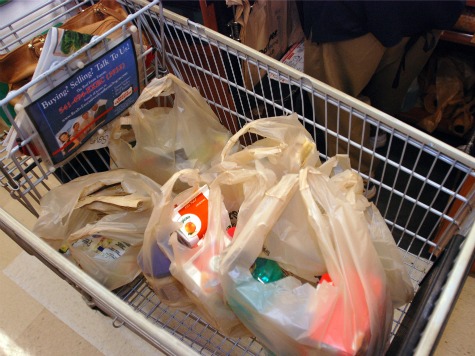Millions of Californians are still reeling from the economic downturn of the last several years. While the economy continues to recover, people are looking to their elected officials for leadership and purpose. Elected officials have a responsibility to positively impact the short- and long-term fortunes of their constituents.
Unfortunately, some of California’s State legislators have forgotten this responsibility. Senator Alex Padilla’s effort to ban 100% recyclable plastic bags statewide through Senate Bill 270 is a dereliction of his duty to protect the interests of hardworking Californians.
SB 270 is little more than a billion dollar cash grab by the California Grocers Association (CGA) and the United Food and Commercial Workers Union (UFCW). These organizations are financially incentivized to support this legislation, which does nothing for the environment, because 100% of the bag fees goes into the pockets of major grocery chains. Simply put, this bill represents a massive wealth transfer from consumers to big grocery chains masquerading as environmental legislation.
Here are some facts.
Plastic bags comprise only 0.4% of the national municipal solid waste stream and are highly reused, so a ban just won’t effectively reduce the amount of garbage sent to landfills. Furthermore, litter studies have concluded that plastic bag litter is typically less than 1% of all litter in the United States.
In addition to failing to meaningfully help the environment, SB 270 may actually create new environmental problems of its own, as it tries to turn people towards thicker plastic “reusable” bags – bags which people will have to buy or, in some cases, pay a fee to receive. To put things in perspective, each year more than 500 million reusable bags are imported to the U.S. from overseas – mainly from China – and they are far more energy intensive to produce and transport, so they have a much larger carbon footprint. Unlike plastic bags, climate change is a legitimate environmental problem – and SB 270 would exacerbate the problem by forcing people to use options that produce more carbon.
In addition to the environment, this bill threatens the livelihoods of the nearly 2,000 hard-working Californians who depend on these jobs in the industry to support their families. SB 270 includes a token $2 million in funding to help manufacturers transition their operations and retrain workers to make thicker, “reusable” plastic bags. But this is laughable amount – about enough to retool roughly half of one production line in one factory – and far from what is required to save these jobs.
California should be proud of its national leadership on environmental issues, but being a real leader does not mean blindly following the latest trendy legislation. Unfortunately, the very real environmental and human costs of this legislation are being ignored in the rush to provide big corporations and their union allies with a new revenue stream. The nearly 2,000 Californians who will be thrown into economic uncertainty, job insecurity and a feeling of abandonment by their leaders are worth more than this misguided proposal, as is California’s record of real leadership on the environment.
There is a real, live and scalable solution to plastic bag and film disposal: recycling. Plastic grocery bags provide some of the cleanest, most useful post-consumer material when recycled properly. If Senator Padilla, the grocers and other advocates of this legislation wanted to do something real for the environment and Californian workers, they would embrace plastic bag recycling and partner with the industry–rather than seeking to undermine it without an alternative for hardworking families.
And any discussion of charging customers fees for bags should be grounded in putting those fees to a public purpose, not lining the pockets of big grocery chains. As written, SB 270 is a job killing, grocer cash grab scam and the legislature should reject it.
Mark Daniels is Chairman of the American Progressive Bag Alliance, a trade association representing more than 30,000 workers in the U.S. plastic bag manufacturing and recycling industry.

COMMENTS
Please let us know if you're having issues with commenting.